Authors
Kei Koga

Kei Koga is associate professor/ head of division at the Public Policy and Global Affairs Programme, School of Social Sciences, Nanyang Technological University (NTU) and affiliated with S. Rajaratnam School of International Studies (RSIS), NTU. He has published on topics that include East Asian/Indo-Pacific security, US and Japanese foreign policies, the US-Japan alliance, and ASEAN. His recent publication includes a book “Managing Great Power Politics: ASEAN, Institutional Strategy, and the South China Sea” (Palgrave 2022), and his articles appear in International Affairs, International Studies Review, Chinese Journal of International Politics, Cambridge Review of International Affairs, Journal of Contemporary China, and Pacific Review. He received his Ph.D. in International Relations at the Fletcher School of Law and Diplomacy, Tufts University.
Articles by Kei Koga
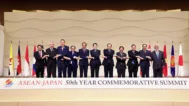
Japan - Southeast Asia
May 2023 — April 2024Strategic Dynamism: 50th Anniversary of Relations and New Security Ties
Japan-Southeast Asia relations marked two milestones in 2023-24. The first was the 50th anniversary of Japan-ASEAN Relations, during which Japan and ASEAN emphasized an equal partnership by adopting the keyword “co-creation” to promote economic prosperity and security stability in Southeast Asia and beyond. The second is strengthening Japan-Philippines bilateral strategic ties, not only bilaterally, but also trilaterally with the United States and quadrilaterally with Australia. Japan continuously engages with other Southeast Asian states and strengthens ties with ASEAN to reinforce ASEAN Centrality and unity, yet a challenge remains: how Japan can design a regional architecture in East Asia and the Indo-Pacific by clarifying the roles and division of labor among those institutions.
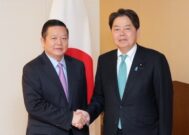
Japan - Southeast Asia
May 2022 — April 2023Great Power Politics: The Indo-Pacific, Southeast Asia, and the Global South
2023 marks the 50th Year of ASEAN-Japan Friendship and Cooperation, and there are expectations that their relationship will be upgraded to a “comprehensive strategic partnership.” Given the good diplomatic, security, and economic relations between Japan and Southeast Asian states, ties are likely to be strengthened. However, Japan is now taking a more competitive strategy toward China, as indicated in the three security documents issued in December 2022, while Southeast Asian states generally continued the same strategic posture by which they have good relations with all great powers in the Indo-Pacific region. Also, while Japan issued the “New Plan for the Free and Open Indo-Pacific” that emphasizes the “Global South,” it remained silent about ASEAN centrality and unity in the Indo-Pacific, and it was unclear what roles Japan expects ASEAN to play. Although both Japan and Southeast Asian states need to adjust their roles in the Indo-Pacific region, it remains to be seen whether the 50th anniversary becomes an opportunity for clarification.
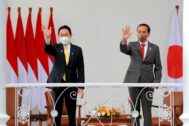
Japan - Southeast Asia
May 2021 — April 2022Normative Challenges in Southeast Asia and the Indo-Pacific
Despite the lingering effects of COVID-19 and another change in leadership in Tokyo, Japan and Southeast Asian states continued to strengthen their functional cooperation. To counter the negative impact of the pandemic, Japan continued to donate vaccines to ASEAN member states. Economically Japan and ASEAN, together with other regional states entered into the Regional Comprehensive Economic Partnership (RCEP) in January 2022. Militarily, Japan conducted the Indo-Pacific Deployment 2021 (IPD21) from August to November 2021, which has become a regularized defense deployment. Further, Japan had the very first bilateral Foreign and Defense Ministerial Meeting with the Philippines in April 2022. Diplomatically, Japan and ASEAN closely consulted with each other to enhance cooperation for the realization of Japan’s “Free and Open Indo-Pacific” (FOIP) vision and ASEAN’s “ASEAN Outlook on the Indo-Pacific” (AOIP). However, Japan-Southeast Asia relations now face new normative challenges regarding how their approach to liberal values, such as rule of law and democracy/human rights in the Indo-Pacific region because of the prolonged Myanmar political crisis and the 2022 Russo-Ukraine war.

ROUNDTABLE
November 3, 2021Japan’s Elections and its Foreign Relations

Japan - Southeast Asia
May 2020 — April 2021A Diplomatic “New Normal” in the Indo-Pacific Region?
Japan-Southeast Asia relations were relatively stable, despite COVID-19, as summarized by three trends: emphasizing multilateral actors; prioritizing enhancement of bilateral relations with two countries (Indonesia and Vietnam); and the synthesis of Japan’s Free and Open Indo Pacific “vision” (FOIP) and ASEAN’s ASEAN Outlook on the Indo-Pacific (AOIP). Japan and Southeast Asian states managed to achieve tangible cooperation, as illustrated by the establishment of the ASEAN Centre for Public Health Emergencies and Emerging Diseases (ACPHEED). Yet, strategic dynamics among Southeast Asia, Japan, and the United States are shifting because of changes in Japanese and US political leadership. Japan, the most reliable partner for Southeast Asia in the Trump era, seemingly faced a relative decline in the importance attached by Southeast Asia because of the United States’ renewed commitment to the region. In the context of this new diplomatic reality, the foremost challenges that Japan and Southeast Asia will likely face in 2021-2022 are Myanmar and ASEAN Centrality in the Indo-Pacific.
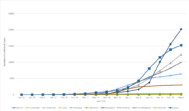
Japan - Southeast Asia
May 2019 — April 2020Great Disruption: Uncertainty over the Indo-Pacific
Japan and Southeast Asia faced completely different situations in 2019 and 2020 because of the emergence of the COVID-19 pandemic. In 2019, Japan-Southeast Asia relations were positive. One of the major developments among Southeast Asian states was the creation of the “ASEAN Outlook on the Indo-Pacific” (AOIP), which resonated with the principles in Japan’s “Free and Open Indo-Pacific” (FOIP) concept; as a result, Japan expressed explicit support for AOIP. Functionally, they made progress, particularly in defense, infrastructure development, and digital fields, as illustrated by various Japanese initiatives—“Vientiane Vision 2.0,” “Initiative on Overseas Loan and Investment for ASEAN,” and “Data Free Flow with Trust.” As such, Japan and Southeast Asian states began to synthesize their respective visions toward the Indo-Pacific and to establish concrete cooperative mechanisms. However, diplomatic momentum was put on halt in 2020 as the COVID-19 pandemic occurred. While Japan, Southeast Asian states, and ASEAN made efforts to coordinate counter-measures, share information and best practices, and provide mutual assistance through teleconferences such as the Special ASEAN Plus Three Summit on Coronavirus Disease 2019 in April 2020, each state faces different social and political situations, making it difficult to cooperate. As such, great uncertainty looms over Japan-Southeast Asia cooperation in the Indo-Pacific.
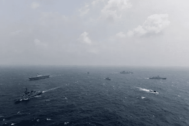
Japan - Southeast Asia
May 2018 — April 2019The Emerging Indo-Pacific Era
Japan-Southeast Asia relations have been largely positive over the past year and this trend will likely continue in a foreseeable future. Relations have gained new political traction since early 2018 from Japan’s “Free and Open Indo-Pacific” (FOIP) concept, which has bolstered Japan’s political, economic, and security engagement with Southeast Asia. There are three main positive trends: a synchronization of Indo-Pacific concepts, Japan’s enhanced security commitment to Southeast Asia, and constructive development of bilateral relations between Japan and Southeast Asian countries, particularly Vietnam. However, these trends have been focused on short-term goals and have not yet cemented a strategic relationship between Southeast Asia and Japan. Accomplishing that longer-term goal depends on whether Japan and Southeast Asian states can effectively manage three emerging challenges: reconciling differences with the US approach to the FOIP, expanding economic connectivity, and developing digital infrastructure.
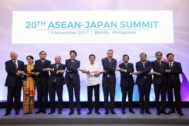
Japan - Southeast Asia
May 2017 — April 2018Redirecting Strategic Focus in the Age of the Indo-Pacific
Japan and Southeast Asia faced a new regional dynamic in 2017 following the inauguration of President Donald Trump in the United States and Philippine President Rodrigo Duterte’s accommodative foreign policy toward China. US withdrawal from the Trans-Pacific Partnership and the Philippines’ unwillingness to discuss the 2016 South China Sea arbitration award forced Japan and some Southeast Asian states to redirect their strategic focus. Most Southeast Asian states increasingly welcome Japan’s regional initiatives in trade, security, and development to fill the vacuum created by these policy shifts. Japan has actively emphasized the “Free and Open Indo-Pacific Strategy,” the geographic scope of which goes well beyond East Asia and covers the entire Pacific Ocean to East Africa. This new strategic focus has revitalized Japan’s cooperation with Southeast Asia. Nevertheless, there are serious challenges that Japan needs to overcome, particularly in clarifying ASEAN’s roles in the strategy.